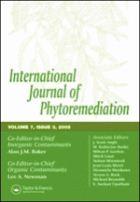|
Literature / Source Database:
International Journal of Phytoremediation
Description
An Official Journal of the Association for Environmental Health and Science and the International Phytotechnology Society.
| Title (short) |
Int. J. Phytoremed. |
| Languages |
English, English |
| First year |
1999 |
| Impact factor |
2.085 |
|
|

|
Status
active
Subject

Source type
Journal
Publisher
ISBN ISSN
1522-6514
E ISSN
1549-7879
First volume
1
Last volume
10+
Homepage
| Resources |
|
Availability |
|
|
|
|
|
| Text PDF |
 |
free access |
 |
| Text Html |
 |
for subscriber |
 |
| References |
 |
not available |
 |
| Abstracts |
 |
|
|
| TOC |
 |
|
|
|
|
|
|

Description
The International Journal of Phytoremediation is the first journal devoted to the publication of current laboratory and field research describing the use of plant systems to remediate contaminated environments. Phytoremediation refers to a diverse group of green technologies that use either naturally occurring or genetically engineered plants to decontaminate polluted air, soil, and water. Phytoremediation technologies currently fall into the following five categories: - Phytodegradation
- Phytostabilization
- Phytovolatization
- Phytoextraction, including rhizofiltration
- Enhanced rhizosphere biodegradation
The journal is a quarterly, international, peer-reviewed publication designed to link professionals in the many environmental disciplines involved in the development, application, management, and regulation of emerging phytoremediation technologies. Manuscripts will be considered that address any of a wide range of issues and interests associated with the entire field of phytoremediation. High quality, original articles make up the primary content, with additional contributions as technical notes, short communications, editorials, and occasional invited review articles. Prior to publication, manuscripts must pass a rigorous peer review process managed by the editor-in-chief. The journal also publishes letters to the editor, book/software reviews, new products and patent information, and announcements of upcoming conferences and courses. The scope of the International Journal of Phytoremediation includes: - Use of phytoremediation processes for environmental restoration.
- Hybrid technologies combining chemical, physical, and/or other biological processes with phytoremediation.
- Any stage of technology development and validation, from basic laboratory research and bench-scale testing to pilot-and full-scale field application.
- Field applications or descriptions of the effects of contaminants and other forms of stress on phytoremediation systems.
- Examinations of the social framework for phytoremediation, including regulatory, economic, and public perception issues.
|